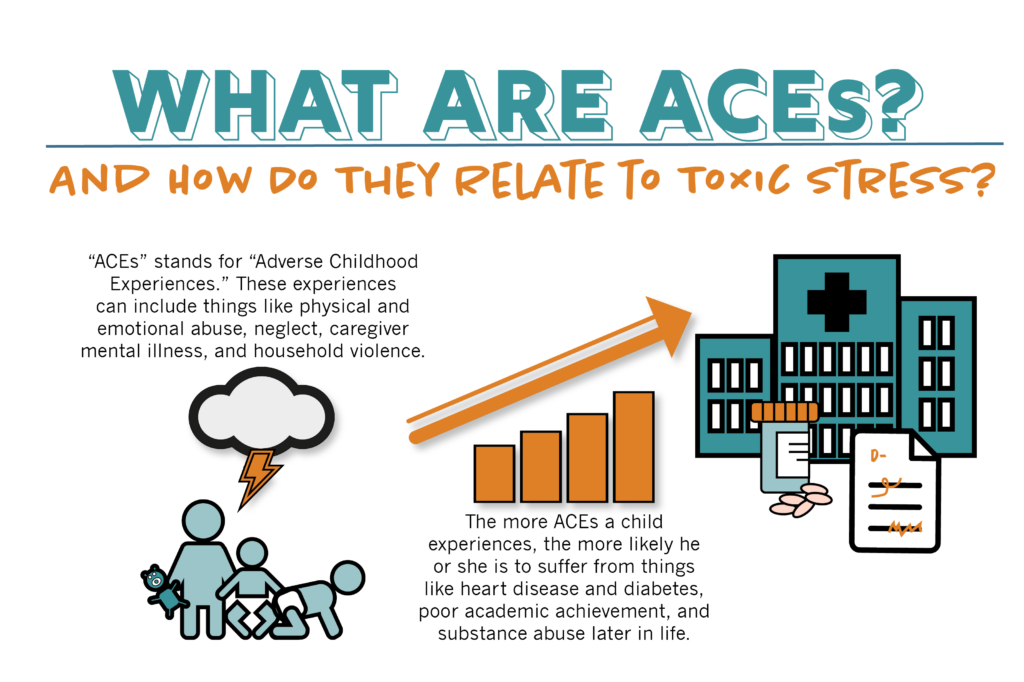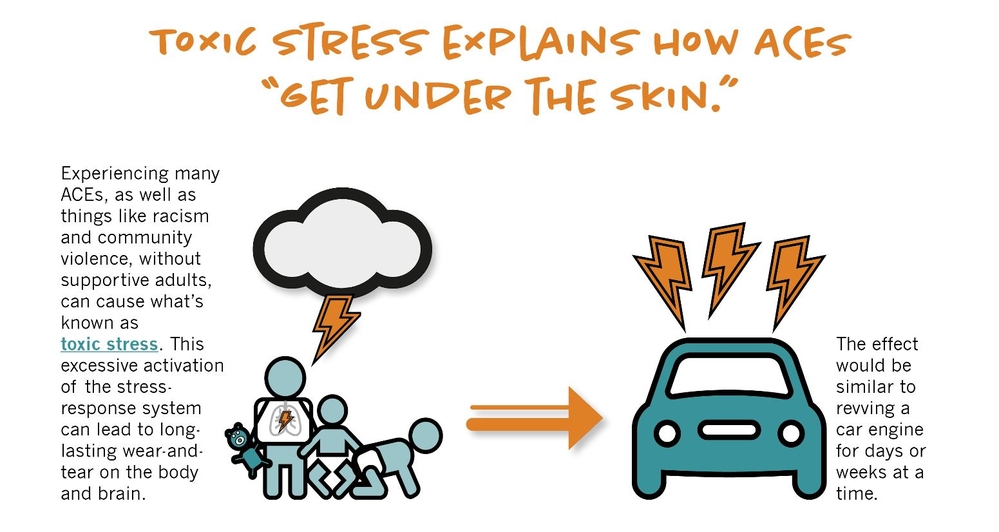


Frequently Asked Questions
What are ACEs?
The term “ACEs” is an acronym for Adverse Childhood Experiences. It originated in a groundbreaking study conducted in 1995 by the Centers for Disease Control and the Kaiser Permanente health care organization in California. In that study, “ACEs” referred to three specific kinds of adversity children faced in the home environment—various forms of physical and emotional abuse, neglect, and household dysfunction. The key findings of dozens of studies using the original ACEs data are: (1) ACEs are quite common, even among a middle-class population: more than two-thirds of the population report experiencing one ACE, and nearly a quarter have experienced three or more. (2) There is a powerful, persistent correlation between the more ACEs experienced and the greater the chance of poor outcomes later in life, including dramatically increased risk of heart disease, diabetes, obesity, depression, substance abuse, smoking, poor academic achievement, time out of work, and early death.

How do ACEs relate to toxic stress?
ACEs research shows the correlation between early adversity and poor outcomes later in life. Toxic stress explains how ACEs ”get under the skin” and trigger biological reactions that lead to those outcomes. In the early 2000s, the National Scientific Council on the Developing Child coined the term “toxic stress” to describe extensive, scientific knowledge about the effects of excessive activation of stress response systems on a child’s developing brain, as well as the immune system, metabolic regulatory systems, and cardiovascular system. Experiencing ACEs triggers all of these interacting stress response systems. When a child experiences multiple ACEs over time—especially without supportive relationships with adults to provide buffering protection—the experiences will trigger an excessive and long-lasting stress response, which can have a wear-and-tear effect on the body, like revving a car engine for days or weeks at a time.
Importantly, the Council also expanded its definition of adversity beyond the categories that were the focus of the initial ACE study to include community and systemic causes—such as violence in the child’s community and experiences with racism and chronic poverty—because the body’s stress response does not distinguish between overt threats from inside or outside the home environment, it just recognizes when there is a threat, and goes on high alert.
What is trauma, and how does it connect to ACEs and toxic stress?
While trauma has many definitions, typically in psychology it refers to an experience of serious adversity or terror—or the emotional or psychological response to that experience. Trauma-informed care or services are characterized by an understanding that problematic behaviors may need to be treated as a result of the ACEs or other traumatic experiences someone has had, as opposed to addressing them as simply willful and/or punishable actions.

Latest Posts
-
Höginsatsspel Så maximerar du dina chanser att vinna stort
·
Höginsatsspel Så maximerar du dina chanser att vinna stort Förstå höginsatsspel Höginsatsspel erbjuder en unik spelupplevelse där spelare kan placera stora insatser med möjlighet till betydande vinster. Dessa spel finns ofta på både fysiska casinon och onlineplattformar, och lockar spelare som söker adrenalinkickar och stora utbetalningar. För att maximera dina chanser att vinna stort, är
-
L’impatto culturale del gioco d’azzardo secondo fatbet casino
·
L’impatto culturale del gioco d’azzardo secondo fatbet casino Il gioco d’azzardo nella società contemporanea Il gioco d’azzardo ha sempre avuto un ruolo significativo nella cultura umana, influenzando stili di vita, tradizioni e persino linguaggi. Nella società contemporanea, il fenomeno è diventato ancora più accessibile grazie all’avvento delle piattaforme online, come FatBet Casino. Questi ambienti virtuali
-
Ansvarsfullt spelande Så skyddar du dig själv och andra
·
Ansvarsfullt spelande Så skyddar du dig själv och andra Vad är ansvarsfullt spelande? Ansvarsfullt spelande handlar om att spela på ett sätt som är underhållande och inte skadligt. Det innebär att sätta gränser för hur mycket tid och pengar man är villig att spendera på spel. Genom att vara medveten om riskerna kopplade till spelande
-
Online-Slots für Germany-Spieler
·
Pistolo Salle de jeu accepte en même temps les dépôts de argent classique sauf que du cryptomonnaies, de sorte à ce que toi-même mesurez des années le alternative fiable. Nos circuits des crédits sont calmés, gratuits, avec des limites justes en fonction de votre accord VIP.
-
Τα καλύτερα online καζίνο στον Καναδά το 2026 135+ εξεταζόμενοι ιστότοποι καζίνο
·
Θα νιώσετε σαν να σας κακομάθουν οι επιλογές που έχετε, ώστε να μπορείτε να επιλέξετε την κατάλληλη ιστοσελίδα τυχερών παιχνιδιών. Δείτε τις επτά καλύτερες συμβουλές μας που θα σας βοηθήσουν να πάρετε τη σωστή απόφαση όταν παίζετε online.
-
Ansvarsfullt spelande så skyddar du dig själv och andra
·
Ansvarsfullt spelande så skyddar du dig själv och andra Vad är ansvarsfullt spelande? Ansvarsfullt spelande handlar om att ha en sund inställning till spel och att kunna njuta av det utan att riskera sin ekonomi eller sitt välbefinnande. Det innebär att sätta gränser för hur mycket tid och pengar man är villig att spendera. Genom
-
The Thrilling World of MotoGP: A Season of Speed and Strategy
·
The roar of engines, the smell of burning rubber, and the thrill of speed define the exhilarating world of MotoGP, the pinnacle of motorcycle racing. As the 2023 season unfolds, fans around the globe are treated to a spectacle of skill, technology, and intense competition that pushes the limits of human and machine alike. This
-
Məşhur qumarbazlar pin-up ilə tanış olun
·
Məşhur qumarbazlar pin-up ilə tanış olun Qumar dünyasının əfsanələri Məşhur qumarbazlar, uzun illər boyunca dünya miqyasında tanınmış və bəzən mübahisəli simalar olmuşdur. Onların hər biri özünəməxsus tərzdə oyunun incəliklərini dərk edərək mükafatlar qazanmışdır. Bu insanların uğurları, bəzən təsadüf nəticəsində, bəzən isə strateji düşünmə qabiliyyətlərinin məhsulu olmuşdur. Oyun mühitində, pin up az simaları oyunçular üçün ilham
-
Gambling mədəniyyəti pin up ilə bağlı maraqlı faktlar
·
Gambling mədəniyyəti pin up ilə bağlı maraqlı faktlar Pin Up kazinolarının tarixi Pin Up kazinoları, müasir dövrün ən populyar onlayn oyun platformalarından biridir. Bu platforma, 2016-cı ildən fəaliyyət göstərir və sürətlə dünya miqyasında tanınmağa başladı. Kazinonun dizaynı retro üslubda tərtib edilib, bu da oyunçulara nostalji hissi yaşadır. Təsadüfi olaraq seçilən retro elementlər, istifadəçiləri cəlb etməklə